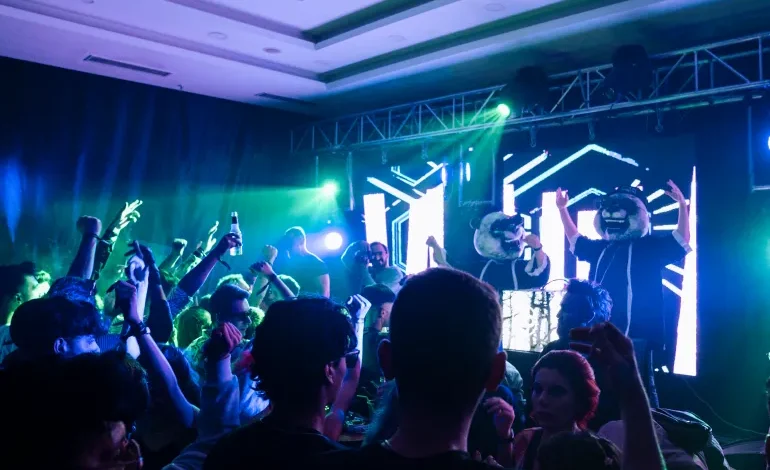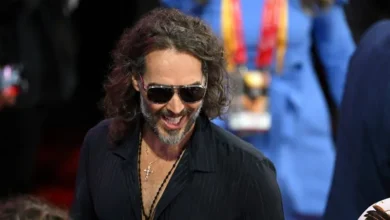The Aleppo electronic artists using music to heal in Gaziantep

Amr Helwani’s fingers swiftly moved the knobs of a DJ mixer up and down while coloured neon lights and white smoke began to swamp the tiled garden of the old Ottoman house where he had set up his console.
The 33-year-old DJ’s techno music energised partygoers on a cold late January night in Gaziantep, a city in southeastern Turkey on the border with Syria. Amr has been in the city since 2013. He, like many of those dancing, fled the Syrian war from Aleppo, less than a two-hour drive away.“We break the sound barrier tonight,” joked Amr, a tall, unassuming man dressed in a black T-shirt, referring to the deafening music. “But no, really, we’re simply trying to break down language and cultural barriers here. Turkish [people] and Syrians … we have very similar traditions but the language is different. Techno is all about the beats, not words. It makes it easier to dance together.”
Amr is one of the resident DJs of Room41, an itinerant techno and electronic music club started by a Syrian refugee that has entertained Gaziantep locals for years. It has also provided an outlet for Syrians to come together to let off steam and meet like-minded people passionate about music.
Little did Amr know, however, that January 28 would signal the last of his shows for a while. “See you all in two weeks!”, he said as he wrapped up the night at 3am.
Just a little more than a week later, catastrophic earthquakes struck southeastern Turkey and northwest Syria, changing the lives of Turks and Syrians forever. More than 50,000 people were killed. In Gaziantep, about 3,000 died, while thousands remain displaced. With continuous aftershocks for weeks and an entire city coping with the trauma of loss and devastation, the lights of Syrian techno nightlife switched off – just as they had during the war.“It’s scary how much it reminded us of the war days: The screams, the sorrow, the displacement… but we promised our audience that music would be back stronger than ever to cheer us up,” Amr said in May from Sakulta, a crowded café in central Gaziantep that sells tickets to Room41. His apartment was spared significant damage but he relocated temporarily further west to the Mediterranean city of Mersin to escape the stress of the constant aftershocks.Fleeing with cultural heritage
Since the beginning of the Syrian conflict in 2011, some 3.7 million refugees have settled in Turkey. The majority of them now live along its southeastern borders, geographically and culturally closer to the motherland.
From old 19th-century Ottoman houses with large domes and black-and-white striped horseshoe-shaped arches to the towering citadel in Gaziantep’s city centre – partly destroyed by the quakes – and narrow cobblestone streets filled with blacksmiths’ workshops and the food smells from eateries, many corners of the city conjure images of pre-war Aleppo for Syrians.
Today, more than half a million Syrians live in this city – a crossroads between Turkish, Kurdish and Arab cultures. Although more than a decade of Syrian presence has led to some friction, it has also reshaped the social and urban face of Gaziantep.“And that includes the potential of new forms of artistic expressions, such as electronic music, which our youth had just begun to discover until the war came,” the 38-year-old with his grey, curly hair tied into a ponytail, added. He was speaking from the rooftop of Douzan’s base – an imposing, well-kept Ottoman house in Gaziantep’s Armenian district.
Through the efforts of cultural organisations and enterprising individuals, Aleppo’s nightlife has moved about 100 kilometres (62 miles) across the border. In what was once a sleepy city, Syrian DJs and electronic music aficionados have recreated the forgotten atmosphere of the nascent scene they left behind.
Focus on the present
Secret raves and underground parties had just started to take off in Aleppo when the war erupted, said Batoul Mohammad, a tall charismatic electronic-music producer with long black hair who divides her time between Gaziantep and Istanbul.
“That abruptly stopped its development, just as our generation was ready to show what we are capable of,” explained the deep-voiced, 36-year-old. “I was a listener at those parties and I spontaneously brought those lessons here in Gaziantep where I realised there was no nightlife. That’s one of the things I missed the most about home.”
Originally from the Syrian city of Homs, she loved what Aleppo had to offer when she could afford to visit on weekends – from spoken word events to rock music concerts. The flourishing cultural atmosphere there was what inspired her to work in the performing arts.
In 2013, at the age of 25, she crossed the border alone into Turkey. Her parents, although they wanted her to stay, supported her decision to pursue her ambitions. She found an apartment in Gaziantep where – determined to work in music – she would spend an average of seven hours a day teaching herself to use music mixing software and watching videos to study DJ sets.
“Focusing on such complicated tasks helped my mind focus on the present moment, rather than fidgeting about my past,” Batoul explained, referring to the pain of leaving her family behind and coming to a country where she often felt unwelcome and experienced verbal abuse just for being Syrian.
For seven years, she worked odd jobs and put her music on the platform SoundCloud. She struggled to find a community of like-minded artists until 2020, when Room41’s founder Nashwan Jamali reached out via Instagram and invited her to perform at one of his events.
Aleppo 2.0: The renaissance of Syrian nightlife
When the war began, Nashwan was a university business student in Aleppo and had just gotten into organising music events. In the early days of the war, he was beaten and arrested by the Syrian police for participating in anti-government protests.
In 2012, Nashwan found himself hiding in underground bunkers – once used as rave venues – to shelter from air raids.
“It’s there I learned how to manage emergency situations at parties [such as fire and earthquake evacuations], like when in case of air strikes at night I had to learn how to evacuate large numbers of people,” he said in a bittersweet tone.
A year later, he crossed the border into Turkey with his older brother in search of a better future, while their parents and older sister stayed in Aleppo. Over time, the memories of police violence, air raids and the fraught illegal crossing into Turkey – when he was terrified Syrian border police would fire on him and his brother – gave way to nostalgic memories of home. He started thinking of creating a place where Syrians of his generation could come together, have fun and remember a better past.
Then, one night in 2016, while inside a Turkish hamam set to 41 degrees Celsius (106F), the 32-year-old entrepreneur got the idea to create an electro-music club the location of which changed for every party.
Electronic artists such as Hello Psychaleppo and Boshoco, both from Aleppo, were conquering European stages. But Nashwan felt it would be meaningful to try to revive Syria’s nightlife in Gaziantep – a city with more in common with his native Aleppo when it comes to food, religion and history – to help Syrians better settle.
“Gaziantep and Aleppo are very similar in terms of people and culture, so this was the right location to try bringing our long-lost nightlife back to life,” Nashwan explained, while sipping a coffee at Sakulta, dressed in his usual T-shirt and sneakers, just before a meeting to organise the next Room41 event.
“It was clear that the majority of us were meant to stay and never go back to Syria – that we needed to integrate,” he added. “And music is often that winning tool.”Nashwan initially thought it would just be something unique if the club travelled but then he decided that bringing it to different neighbourhoods could overturn the conception that Syrians stick to themselves, promoting integration.
The concept was new and Syrians face extra paperwork when starting businesses so it took took about a year for Nashwan to register Room41. Initially, as he waited for the registration, he could not properly advertise the inaugural parties and the turnout was low. Drug dealers tried to infiltrate the parties, too. So Nashwan hired security staff and pushed ahead with his project. “We knew we were doing something for the community, filling a gap,” Nashwan reflected.
Today, Nashwan has 19 staff, both Syrians and Turks. Room41 ticket prices are affordable compared with the same type of parties in bigger cities – like the capital Istanbul or Izmir on the Aegean coast – and an average of 300 people attend their events held twice a month on a Saturday night. In its six years of parties, Room41 has also provided a platform for many up-and-coming Syrian DJs.Processing trauma
Amr, a resident DJ with Room41 for the past three years, is one of those artists.
Like Nashwan, he was arrested and beaten in Aleppo for taking part in anti-government protests. Fearing that he could end up in jail or disappear, Amr crossed illegally into Turkey in 2013. His family stayed behind. Although he remains in contact with and misses them, he has not been able to see them since leaving.
While growing up in Aleppo, Amr was an avid metal and rock concertgoer. When he came to Turkey he deeply missed live music that went beyond old folk songs played inside cafés.
Amr, who is by day an employee with a humanitarian NGO, taught himself to mix and produce music to distract himself from the memories of air strikes in Aleppo and focus on something other than not being with his family. “It started as a hobby but then I felt the need to show the people what I’m doing,” Amr explained, as he scratched back tapes at the party in January.
The act of creating music, listening to it and sharing it with others who give him feedback empties his mind and makes him focus on building something for others, Amr says. It is the most healing activity he has found.
In his music, he mixes traditional Arab music sounds like the oud – a stringed instrument – or Syrian folk songs – like the iconic track Ayni Tsofia – with more Western tracks he found in YouTube videos of Berlin raves he dreams of playing at one day. Obtaining a tourist visa to participate in one of these is extremely hard for a Syrian, he says.
His goal is to create a kind of futuristic Syrian sound with an eye to the past. “I love combining oriental sounds from our own tradition with more Western beats,” he reflected. “I think it brings something new.”
Keeping memory alive
There have been efforts to encourage this form of cultural expression by organisations like Douzan. In late 2022, Rami of Douzan launched a three-month programme called Notah (“music note” in Arabic) with seven young Syrian artists.
“Electro music is something very new in our region but very attractive for our youth,” Rami said. “We wanted to combine it with an opportunity to know more about their history and music because when they left Syria, they were too young and they’re losing the connection to their roots.”
The artists were mentored by DJs such as Amsterdam-based Hello Psychaleppo. They did workshops on folk music – learning how to blend traditional and contemporary tracks – and published a collective album.
“It’s a way to show we are not stuck in the past, that we are proud of our tradition but that we can also express [ourselves] in modern terms,” Rami explained.
“Before the city turned into rubble, our generation had a bright future ahead,” Nashwan said.
Joudy al-Ahmad, a humanitarian worker and an avid Room41 participant also from Aleppo, feels transported when she hears snippets of Arab and Syrian folk melodies, or bits of songs by the legendary Egyptian singer Umm Kulthum or the Lebanese vocalist Fayrouz – who her parents would play when she was a child – mixed with electro sounds. “I suddenly perceive a piece of Syria,” said the 30-year-old, adding that this music “overwhelms me with emotions every time”.










